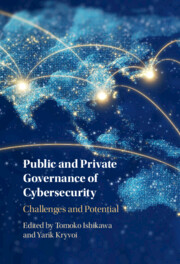Book contents
- Public and Private Governance of Cybersecurity
- Public and Private Governance of Cybersecurity
- Copyright page
- Contents
- Contributors
- Acknowledgements
- Abbreviations
- 1 Introduction
- 2 International Relations Perspectives
- 3 The State-Oriented Model of Internet Regulation
- 4 Cybercrime, the United Nations, Prospects, and Challenges for International Co-operation
- 5 Responding to Public and Private Cyberattacks
- 6 International Data Transfers and Cybersecurity
- 7 International Trade Law and Cybersecurity
- 8 Cyberthreats, Human Rights, and FDI Restrictions
- 9 Public–Private Partnerships on Cybersecurity and International Law
- 10 The Geopolitical Divide, Norm Conflict, and Public–Private Partnership in Cybersecurity Governance
- Index
10 - The Geopolitical Divide, Norm Conflict, and Public–Private Partnership in Cybersecurity Governance
Published online by Cambridge University Press: 09 November 2023
- Public and Private Governance of Cybersecurity
- Public and Private Governance of Cybersecurity
- Copyright page
- Contents
- Contributors
- Acknowledgements
- Abbreviations
- 1 Introduction
- 2 International Relations Perspectives
- 3 The State-Oriented Model of Internet Regulation
- 4 Cybercrime, the United Nations, Prospects, and Challenges for International Co-operation
- 5 Responding to Public and Private Cyberattacks
- 6 International Data Transfers and Cybersecurity
- 7 International Trade Law and Cybersecurity
- 8 Cyberthreats, Human Rights, and FDI Restrictions
- 9 Public–Private Partnerships on Cybersecurity and International Law
- 10 The Geopolitical Divide, Norm Conflict, and Public–Private Partnership in Cybersecurity Governance
- Index
Summary
The chapter analyses existing regional cybersecurity treaties to highlight the differences in these treaties that reflect the divide between the state-oriented and market-oriented models of internet governance, and to find possible areas of convergence that may pave the way towards global co-operation. It also discusses the role and limitations of the private sector, including IT industries, technical experts, and civil societies, in cybersecurity governance. Realistic scenarios of future global cybersecurity governance would envision expanding and strengthening regional co-operation and co-operation between like-minded states. However, reaching a consensus on particular cybersecurity issues will not automatically result in effective cybersecurity governance. Fundamental differences in the levels of cyber-preparedness and the ability of states to combat cybercrimes will create a living space for cybercriminals and other malign actors to engage in illegal activities. Continuous efforts to support states with less cybercapacity, including through strengthening education, technical skills, and material resources should accompany any attempts to create cybersecurity governance norms.
Keywords
- Type
- Chapter
- Information
- Public and Private Governance of CybersecurityChallenges and Potential, pp. 240 - 264Publisher: Cambridge University PressPrint publication year: 2023

